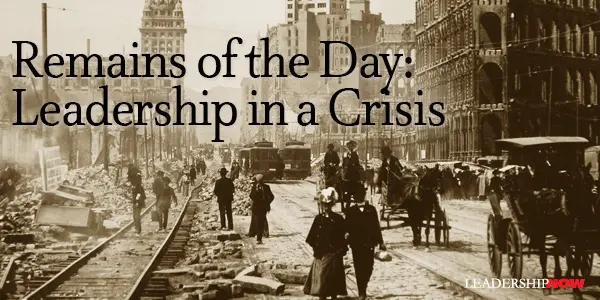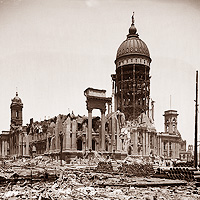 |
 |
04.18.06

Remains of the Day: Leadership in a Crisis
ONE-HUNDRED YEARS AGO today San Francisco was struck with what is estimated today to be a 7.7 to 7.9 earthquake. The first shock hit at 5:18 A.M. Perhaps more devastating than the quake were the fires that broke out almost immediately. With the main water lines broken, firefighters were virtually helpless. By April 21 when the last fires died out, the earthquake and the events that followed destroyed 2,831 acres of the city, more than 490 blocks. It consumed 30 schools, 80 churches, and 250,000 homes. It killed at least 3,000 people.  Catastrophes or a major crisis of any kind are a breeding ground for bad decisions due to the swiftness with which they must be made. Time becomes the enemy and buying time to think becomes a luxury. Just hours after the earthquake, and acting on what turned out to be more rumor than fact, San Francisco’s mayor Eugene Schmitz posted a proclamation declaring that local police and troops were to "shoot to kill" any looters. A decision that is unconscionable and certainly illegal. Needless to say, widespread looting never materialized. Then as now, catastrophes also bring out the gainsayers. While constructive criticism and reflection is mandatory to bring about improvements in handling such disasters, the obsessive babblings of the uniformed only distract from and impede this process. The problem of self-restraint is always with us as it is part of the human condition. Civility and maturity don't seem to be as highly valued today as are unfettered access to media and the right to speak one's opinion even if that opinion is lacking in thought and wisdom. Unlike 100 years ago, today we can be inundated with bits of information totally removed from its context before the leaders involved can even make sense of it and move constructively in a direction that benefits the greatest good. Leaders will make mistakes. A leader collecting their thoughts and not dashing out the door is prudent and not a sign of weakness. That's the job of a leader: to keep their head when all about them others are losing theirs. Leaders who take advantage of a crisis for their own gain need to be dealt with to be sure, but not for the personal gain of those individuals given the solemn task of reviewing that leaders behavior in the aftermath.
Posted by Michael McKinney at 12:16 AM
|
BUILD YOUR KNOWLEDGE
 

How to Do Your Start-Up Right STRAIGHT TALK FOR START-UPS 
Grow Your Leadership Skills NEW AND UPCOMING LEADERSHIP BOOKS 
Leadership Minute BITE-SIZE CONCEPTS YOU CAN CHEW ON 
Classic Leadership Books BOOKS TO READ BEFORE YOU LEAD |